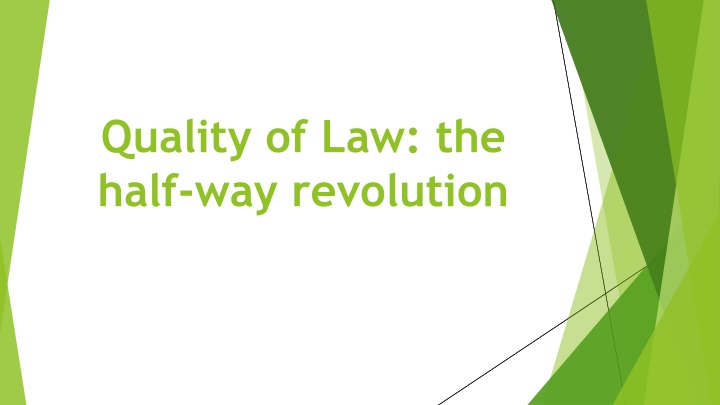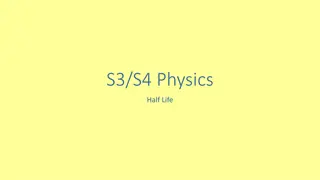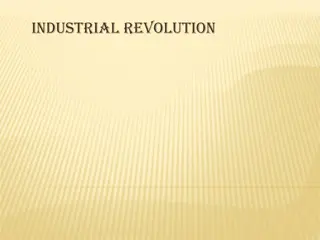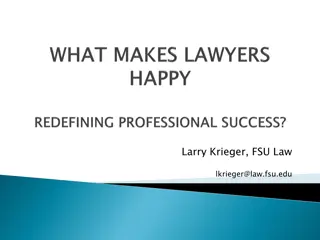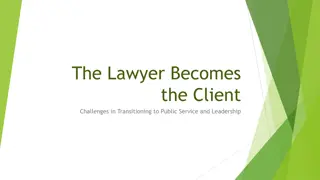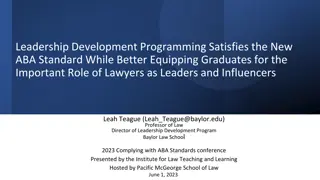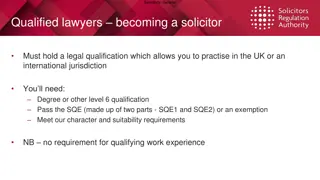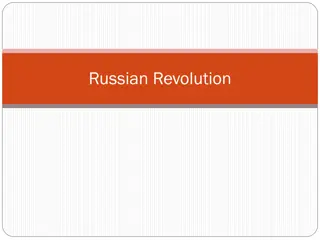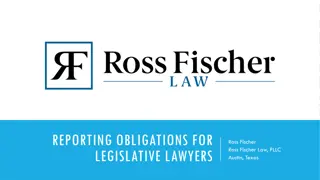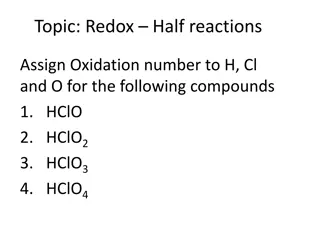Quality of Law: The Half-Way Revolution Overview for Non-Lawyers
Traveaux preparatoires and early jurisprudence lay the foundation for understanding minimum requirements of law and exceptions, as outlined in Articles 8 to 11 of the ECHR. Explore the rights to respect for private and family life, freedom of thought, conscience, religion, expression, assembly, and association. Discover the historical context behind the evolution of legal principles towards upholding fundamental freedoms.
Download Presentation

Please find below an Image/Link to download the presentation.
The content on the website is provided AS IS for your information and personal use only. It may not be sold, licensed, or shared on other websites without obtaining consent from the author.If you encounter any issues during the download, it is possible that the publisher has removed the file from their server.
You are allowed to download the files provided on this website for personal or commercial use, subject to the condition that they are used lawfully. All files are the property of their respective owners.
The content on the website is provided AS IS for your information and personal use only. It may not be sold, licensed, or shared on other websites without obtaining consent from the author.
E N D
Presentation Transcript
Quality of Law: the half-way revolution
Overview Introduction for non-lawyers Traveaux preparatoires Early jurisprudence Minimum requirements of law Exceptions
Introduction for non-lawyers ARTICLE 8 Right to respect for private and family life 1. Everyone has the right to respect for his private and family life, his home and his correspondence. 2. There shall be no interference by a public authority with the exercise of this right except such as is in accordance with the law and is necessary in a democratic society in the interests of national security, public safety or the economic well-being of the country, for the prevention of disorder or crime, for the protection of health or morals, or for the protection of the rights and freedoms of others. ARTICLE 9 Freedom of thought, conscience and religion 1. Everyone has the right to freedom of thought, conscience and religion; this right includes freedom to change his religion or belief and freedom, either alone or in community with others and in public or private, to manifest his religion or belief, in worship, teaching, practice and observance. 2. Freedom to manifest one s religion or beliefs shall be subject only to such limitations as are prescribed by law and are necessary in a democratic society in the interests of public safety, for the protection of public order, health or morals, or for the protection of the rights and freedoms of others. ARTICLE 10 Freedom of expression 1. Everyone has the right to freedom of expression. This right shall include freedom to hold opinions and to receive and impart information and ideas without interference by public authority and regardless of frontiers. This Article shall not prevent States from requiring the licensing of broadcasting, television or cinema enterprises. 2. The exercise of these freedoms, since it carries with it duties and responsibilities, may be subject to such formalities, conditions, restrictions or penalties as are prescribed by law and are necessary in a democratic society, in the interests of national security, territorial integrity or public safety, for the prevention of disorder or crime, for the protection of health or morals, for the protection of the reputation or rights of others, for preventing the disclosure of information received in confidence, or for maintaining the authority and impartiality of the judiciary ARTICLE 11 Freedom of assembly and association 1. Everyone has the right to freedom of peaceful assembly and to freedom of association with others, including the right to form and to join trade unions for the protection of his interests. 2. 2. No restrictions shall be placed on the exercise of these rights other than such as are prescribed by law and are necessary in a democratic society in the interests of national security or public safety, for the prevention of disorder or crime, for the protection of health or morals or for the protection of the rights and freedoms of others. This Article shall not prevent the imposition of lawful restrictions on the exercise of these rights by members of the armed forces, of the police or of the administration of the State.
Traveaux preparatoires Article 7 of the original proposal of the ECHR laid down: The object of this collective guarantee shall be to ensure that the laws of each state in which are embodied the guaranteed rights and freedoms as well as the application of these laws are in accordance with "the general principles of law as recognised by civilised nations" and referred to in Article 38c of the Statute of the International Court of Justice. Instead, a reference to the rule of law was moved to the non-operative part of the Convention, the preamble, holding: Being resolved, as the governments of European countries which are like-minded and have a common heritage of political traditions, ideals, freedom and the rule of law, to take the first steps for the collective enforcement of certain of the rights stated in the Universal Declaration .
Traveaux preparatoires A proposal was made to annex a special Convention to the ECHR, to law down principles of the rule of law. In my opinion, what we must fear to-day is not the seizure of power by totalitarianism by means of violence, but rather that totalitarianism will attempt to put itself in power by pseudo-legitimate means. [] For example, the Italian constitution was never repealed, all constitutional principles remained in theory, but the special laws approved by the Chambers, elected in one misdirected campaign, robbed the constitution little by little of all its substance, especially of its substance of freedom. The battle against totalitarianism should rather be modified and should become a battle against abuse of legislative power, rather than abuse of executive power.
Traveaux preparatoires It seems to suggest that the only form of reparation will be compensation. It seems to suggest that the European Court will be able to grant indemnities to victims, damages and interest, or reparation of this kind. It does not say that the European Court will be able to pronounce the nullity or invalidity of the rule, or the law, or the decree which constitutes a violation of the Convention. That, Ladies and Gentlemen, is something very grave. True, reparation in kind may be advisable where the victim is a specified individual. In case of an action ultra vires of this sort on the part of the local police, a mayor, a prefect, or even a minister, satisfaction may be given in the form of reparation in cash or the awarding of an indemnity. But can the graver form of violation which consists in removing a fundamental law guaranteeing a specific freedom for the whole nation, from the laws of a country in virtue of some law or decree, can such a violation be redressed by awarding a symbolic farthing darn ages to the citizens of the country? If, tomorrow, France were to sink into a dictatorship, and if her dictator were to suppress the freedom of the Press, would the European Court award a franc damages to all Frenchmen so as to compensate for the injury which the suppression of this fundamental freedom had caused them? Such a proceeding would not make sense. If we really want an European Court to succeed in guaranteeing the rights which we have placed under its protection, we must grant jurisdiction to declare void, if need be, the laws and decrees which violate the Convention.
Early jurisprudence NO Interstate complaints No groups Very few legal persons Natural persons only when directly + individually harmed No In abstracto claims
Early jurisprudence Sunday Times (1979): Firstly, the law must be adequately accessible: the citizen must be able to have an indication that is adequate in the circumstances of the legal rules applicable to a given case. Secondly, a norm cannot be regarded as a "law" unless it is formulated with sufficient precision to enable the citizen to regulate his conduct: he must be able - if need be with appropriate advice - to foresee, to a degree that is reasonable in the circumstances, the consequences which a given action may entail. Those consequences need not be foreseeable with absolute certainty: experience shows this to be unattainable. Again, whilst certainty is highly desirable, it may bring in its train excessive rigidity and the law must be able to keep pace with changing circumstances.
Early jurisprudence the ECtHR shifts the attention from the question of whether the executive power has abided by the boundaries set out by the legislative power, to the question of whether laws and legal doctrines as such are sufficiently clear to citizens. Citizens should be able to foresee to a reasonable extent what repercussions certain actions or inactions will have. If citizens don t know which actions are forbidden or not, they won t be able to follow the rules. In this sense, it is a matter of legal effectiveness that citizens that generally want to follow the prevailing legal standards are able to do so. Although in Sunday Times, the Court had made explicit that the principles of accessibility and foreseeability derived from the term prescribed by law , used in Articles 9, 10 and 11 ECHR, and not from in accordance with the law , used in Article 8 ECHR, just a number of years later, in the case of Silver and others (1983), this distinction was absolved .
Early jurisprudence Malone: additional safeguards for secret services In Leander (1987), this line of interpretation was confirmed when the Court stressed that, while laws can normally be more open, because policies and actions by governmental organisations are generally disclosed to the public, where the implementation of the law consists of secret measures, not open to scrutiny by the individuals concerned or by the public at large, the law itself, as opposed to the accompanying administrative practice, must indicate the scope of any discretion conferred on the competent authority with sufficient clarity, having regard to the legitimate aim of the measure in question, to give the individual adequate protection against arbitrary interference.
Early jurisprudence Kruslin and Huvig (1990), the Court focussed almost entirely on the existence of adequate safeguards against the abuse of power. It stressed that only some of the safeguards were expressly provided for in law and concluded that the system did not afford adequate safeguards, citing a number of reasons such as, but not limited to: Unclarity with respect to the categories of people liable to have their telephones tapped; - Unclarity with respect to the nature of the offences which may give rise to such an order; - Absence of a limit on the duration of telephone tapping; - No procedure for drawing up the summary reports containing intercepted conversations; - Unclarity on the point of the precautions to be taken in order to communicate the recordings for possible inspection by the judge and the defence; - Unclarity about the circumstances in which recordings may or must be erased.
Early jurisprudence Although the Court still points to the importance of legal certain for citizens, its main concern is not so much with abuse of power by the executive branch (using powers beyond the boundaries set by the legislator) but with arbitrary use of power (where the executive stays within those boundaries, but the problem is that the boundaries are very broad or non-existent). In addition, an important alteration is that the principle of foreseeability is interpreted not so much as requiring that citizens should be able to know which actions are or are not prohibited (as secret surveillance by police units or intelligence agencies are generally introduced to uncover terrorist cells, organised crimes, etc., about which there is generally no doubt whether they are prohibited or not) but with the foreseeability of how the executive branch would use its powers, when and to whom. Consequently, while the original formulation of the notions of accessibility and foreseeability concerned the relationship between the legislative branch and citizens, this interpretation of the principles focusses primarily on the relationship between the legislative branch and the executive branch, as the legislative power must set clear boundaries for the use of power the executive must respect.
Minimum Requirements of Law Zakharov v. Russia (2015) Centrum F r R ttvisa v. Sweden (2018) Big Brother Watch and others v. the United Kingdom (2019)
Minimum Requirements of Law In such circumstances the threat of surveillance can be claimed in itself to restrict free communication through the postal and telecommunication services, thereby constituting for all users or potential users a direct interference with the right guaranteed by Article 8. There is therefore a greater need for scrutiny by the Court, and an exception to the rule denying individuals the right to challenge a law in abstracto is justified. In such cases the individual does not need to demonstrate the existence of any risk that secret surveillance measures were applied to him. By contrast, if the national system provides for effective remedies, a widespread suspicion of abuse is more difficult to justify. In such cases, the individual may claim to be a victim of a violation occasioned by the mere existence of secret measures or of legislation permitting secret measures only if he is able to show that, due to his personal situation, he is potentially at risk of being subjected to such measures.
Minimum Requirements of Law Fits in general approach to focus more and more on legislator the Strasbourg Court is not a court of fourth instance , it is not a court of appeal, or a court of revision or of cassation. It cannot question the domestic courts establishment of the facts in your case, nor their assessment or application of domestic law, nor your guilt or innocence in a criminal case. Zakharov: In view of the above considerations, the Court finds that Russian law does not provide for effective remedies to a person who suspects that he has been subjected to secret surveillance. By depriving the subject of interception of the effective possibility of challenging interceptions retrospectively, Russian law thus eschews an important safeguard against the improper use of secret surveillance measures. For the above reasons, the Court also rejects the Government s objection as to non-exhaustion of domestic remedies. Big Brother Watch: even the subjective belief of ineffectiveness is enough
Minimum Requirements of Law Conventionality: an abstract review of the conventionality of a Greek law, while acting as a court of first instance. The Grand Chamber not only reviews the Convention compliance of a law which has not been applied to the applicants, but furthermore does it without the benefit of prior scrutiny of that same legislation by the national courts. In other words, the Grand Chamber invests itself with the power to examine in abstracto the Convention compliance of laws without any prior national judicial review.
Minimum Requirements of Law Normally, even in cases revolving around the quality of law, the ECtHR would not say that, let alone specify how, a Member State would need to change its laws. Formally speaking, the Court only holds that there has been a violation of the Convention and whether the state needs to pay damages to the applicants. One of the problems of focusing on concrete violations of the Convention was that structural problems were sometimes left unaddressed. Suppose a Member State had in place a law or policy through which the legislative power granted the executive power the authority to violate the Convention. Under its standards approach, the ECtHR would not rule that that law or policy should be changed or amended, but only that the violation in a concrete matter was in violation of the Convention.
Minimum Requirements of Law This approach has had two consequences. - First, because the Court did not order the legislative branch explicitly to remedy legislative regime and structural problem as such, a continuing violation of the Convention could persist. - Second, and following from that, this sometimes resulted in a high number of cases before the Court, on occasions reaching a number of several thousand individual applications per underlying issue. Seeing this problem, at the Conference on the Future of the European Court of Human Rights on 18 19 February 2010, the Interlaken Declaration and Action Plan was adopted, requesting the Court to develop clear and predictable standards for a pilot judgment procedure.
References to how prudently (or not) powers are used in practice References to another minimum requirement of law the Court did not find it necessary to pursue further the issue of the accessibility of the domestic law. It will concentrate instead on the requirements of foreseeability and necessity . Zakharov 1. Accessibility of the domestic law This is a question that goes to the foreseeability and necessity of the relevant law, rather than its accessibility. Big Brother Watch
References to how prudently (or not) powers are used in practice References to another minimum requirement of law 2. Scope of application of the secret surveillance measures 2.1 The nature of the offences which may give rise to an interception order; Although the Russian law leaves the authorities an almost unlimited degree of discretion in determining which events or acts constitute such a threat and whether that threat is serious enough to justify secret surveillance, thereby creating possibilities for abuse , the Court did not find a violation on this point. Instead, it referred to the fact that prior judicial authorisation for interceptions is required in Russia. Such judicial authorisation may serve to limit the law-enforcement authorities discretion []. Zakharov Bulk interception is by definition untargeted, and to require reasonable suspicion would render the operation of such a scheme impossible. Similarly, the requirement of subsequent notification assumes the existence of clearly defined surveillance targets, which is simply not the case in a bulk interception regime. Judicial authorisation, by contrast, is not inherently incompatible with the effective functioning of bulk interception. While the Court has recognised that judicial authorisation is an important safeguard against arbitrariness , to date it has not considered it to be a necessary requirement or the exclusion of judicial control to be outside the limits of what may be deemed necessary in a democratic society . (Big Brother Watch) 2.2 A definition of the categories of people liable to be subject to surveillance measures. while anyone could potentially have their communications intercepted under the section 8(4) regime, it is clear that the intelligence services are neither intercepting everyone s communications, nor exercising an unfettered discretion to intercept whatever communications they wish. Big Brother Watch
References to how prudently (or not) powers are used in practice References to another minimum requirement of law 3. The duration of secret surveillance measures 3.1 The period after which an interception warrant will expire; 3.2 The conditions under which a warrant can be renewed; 3.3 The circumstances in which it must be cancelled. the duty on the Secretary of State to cancel warrants which were no longer necessary meant, in practice, that the intelligence services had to keep their warrants under continuous review. Big Brother Watch notwithstanding that the relevant legislation is less clear with regard to the third safeguard, it must be borne in mind that any permit is valid for a maximum of six months and that a renewal requires a review as to whether the conditions are still met. Centrum f r R ttvisa
References to how prudently (or not) powers are used in practice References to another minimum requirement of law 4. The procedures for processing data 4.1 Storing; Although the FRA may maintain databases for raw material containing personal data up to one year, it has to be kept in mind that raw material is unprocessed information. That is, it has yet to be subjected to manual treatment. The Court accepts that it is necessary for the FRA to store raw material before it can be manually processed. Centrum f r R ttvisa IPT can examine whether the time-limits for retention have been complied with and, if they have not, it may find that there has been a breach of Article 8 of the Convention and order the destruction of the relevant material. Big Brother Watch while the specific retention periods are not in the public domain, it is clear that they cannot exceed two years and, in practice, they do not exceed one year (with much content and related communications data being retained for significantly shorter periods). Big Brother Watch 4.2 Accessing; 4.3 Examining; 4.4 Using; 4.5 Destroying.
References to how prudently (or not) powers are used in practice References to another minimum requirement of law 5. Authorisation procedures 5.1 The authority competent to authorise the surveillance; It is true that the Court has generally required a non-judicial authority to be sufficiently independent of the executive. However, it must principally have regard to the actual operation of a system of interception as a whole, including the checks and balances on the exercise of power, and the existence (or absence) of any evidence of actual abuse, such as the authorising of secret surveillance measures haphazardly, irregularly or without due and proper consideration. In the present case there is no evidence to suggest that the Secretary of State was authorising warrants without due and proper consideration. Big Brother Watch In practice, courts never requested the interception agency to submit additional materials and that a mere reference to the existence of information about a criminal offence or activities endangering national, military, economic or ecological security is considered to be sufficient for the authorisation to be granted. Zakharov 5.2 Its scope of review; while the privacy protection representative cannot appeal against a decision by the Foreign Intelligence Court or report any perceived irregularities to the supervisory bodies, the presence of the representative at the court s examinations compensates, to a limited degree, for the lack of transparency concerning the court s proceedings and decisions. Centrum f r R ttvisa examine with particular attention whether the supervision arrangements provided by Russian law are capable of ensuring that all interceptions are performed lawfully on the basis of proper judicial authorisation. Zakharov 5.3 The content of the interception authorisation.
References to how prudently (or not) powers are used in practice References to another minimum requirement of law 6. Ex post supervision of the implementation of secret surveillance measures 6.1 Independence; The ECtHR noted that the public prosecutor could hardly be said to be an independent supervisory authority, but still it did find a violation on that specific point. Zakharov 6.2 Competence. it is for the Government to illustrate the practical effectiveness of the supervision arrangements with appropriate examples. Zakharov while there is no evidence to suggest that the intelligence services are abusing their powers on the contrary, the Interception of Communications Commissioner observed that the selection procedure was carefully and conscientiously undertaken by analysts , the Court is not persuaded that the safeguards governing the selection of bearers for interception and the selection of intercepted material for examination are sufficiently robust to provide adequate guarantees against abuse. Big Brother Watch
References to how prudently (or not) powers are used in practice References to another minimum requirement of law 7. Conditions for communicating data to and receiving data from other parties 7.1 Communicating; Although in the Court s view, the mentioned lack of specification in the provisions regulating the communication of personal data to other states and international organisations gives some cause for concern with respect to the possible abuse of the rights of individuals. On the whole, however, the Court considered that the supervisory elements described below sufficiently counterbalance these regulatory shortcomings. Centrum f r R ttvisa 7.2 Receiving. As the Government, at the hearing, informed the Court that it was implausible and rare for intercept material to be obtained unsolicited , the Court will restrict its examination to material falling into the second and third categories. Big Brother Watch no request for intercept material has ever been made in the absence of an existing RIPA warrant. Big Brother Watch
References to how prudently (or not) powers are used in practice References to another minimum requirement of law 8. Notification of interception of communications Court was clearly unsympathetic to this approach, it did not find a violation on this point, stressing that it would bear the absence of notification and the lack of an effective possibility of requesting and obtaining information, when assessing the effectiveness of remedies available under Russian law. Zakharov Taking into account that the requirement to notify the subject of secret surveillance measures is not applicable to the applicant and is, in any event, devoid of practical significance, like in Zakharov, the Court underlined that its findings on the point of the notification would be taken into account when evaluating the last minimum requirement of law: the available remedies. Centrum f r R ttvisa
References to how prudently (or not) powers are used in practice References to another minimum requirement of law 9. Available remedies In the Court s view, the aggregate of remedies, although not providing a full and public response to the objections raised by a complainant, must be considered sufficient in the present context, which involves an abstract challenge to the signals intelligence regime itself and does not concern a complaint against a particular intelligence measure. In reaching this conclusion, the Court attaches importance to the earlier stages of supervision of the regime, including the detailed judicial examination by the Foreign Intelligence Court of the FRA s requests for permits to conduct signals intelligence and the extensive and partly public supervision by several bodies, in particular the Foreign Intelligence Inspectorate. Centrum f r R ttvisa
